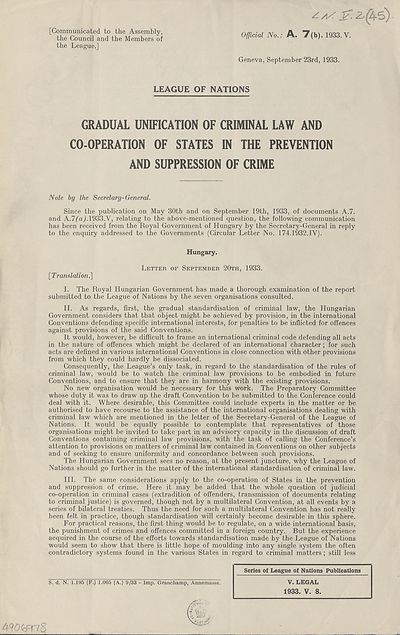Legal > Gradual unification of criminal law and co-operation of states in the prevention and suppression of crime [reply received from Hungary].
(1)
Download files
Complete book:
Individual page:
Thumbnail gallery: Grid view | List view

[Communicated to the Assembly,
the Council and the Members of
the League.]
‘'My, 2.^.5)•
Official No.: A. 7(b). 1933. V.
Geneva, September 23rd, 1933.
LEAGUE OF NATIONS
GRADUAL UNIFICATION OF CRIMINAL LAW AND
CO-OPERATION OF STATES IN THE PREVENTION
AND SUPPRESSION OF CRIME
Note by the Secretary-General.
Since the publication on May 30th and on September 19th, 1933, of documents A.7.
and A.7("aj.l933.V, relating to the above-mentioned question, the following communication
has been received from the Royal Government of Hungary by the Secretary-General in reply
to the enquiry addressed to the Governments (Circular Letter No. 174.1932.IV).
Hungary.
Letter of September 20th, 1933.
[Translation.]
I. The Royal Hungarian Government has made a thorough examination of the report
submitted to the League of Nations by the seven organisations consulted.
II. As regards, first, the gradual standardisation of criminal law, the Hungarian
Government considers that that object might be achieved by provision, in the international
Conventions defending specific international interests, for penalties to be inflicted for offences
against provisions of the said Conventions.
It would, however, be difficult to frame an international criminal code defending all acts
in the nature of offences which might be declared of an international character; for such
acts are defined in various international Conventions in close connection with other provisions
from which they could hardly be dissociated.
Consequently, the League’s only task, in regard to the standardisation of the rules of
criminal law, would be to watch the criminal law provisions to be embodied in future
Conventions, and to ensure that they are in harmony with the existing provisions.
No new organisation would be necessary for this work. The Preparatory Committee
whose duty it was to draw up the draft Convention to be submitted to the Conference could
deal with it. Where desirable, this Committee could include experts in the matter or be
authorised to have recourse to the assistance of the international organisations dealing with
criminal law which are mentioned in the letter of the Secretary-General of the League of
Nations. It would be equally possible to contemplate that representatives of those
organisations might be invited to take part in an advisory capacity in the discussion of draft
Conventions containing criminal law provisions, with the task of calling the Conference’s
attention to provisions on matters of criminal law contained in Conventions on other subjects
and of seeking to ensure uniformity and concordance between such provisions.
The Hungarian Government sees no reason, at the present juncture, why the League of
Nations should go further in the matter of the international standardisation of criminal law.
III. The same considerations apply to the co-operation of States in the prevention
and suppression of crime. Here it may be added that the whole question of judicial
co-operation in criminal cases (extradition of offenders, transmission of documents relating
to criminal justice) is governed, though not by a multilateral Convention, at all events by a
series of bilateral treaties. Thus the need for such a multilateral Convention has not really
been felt in practice, though standardisation will certainly become desirable in this sphere.
For practical reasons, the first thing would be to regulate, on a wide international basis,
the punishment of crimes and offences committed in a foreign country. But the experience
acquired in the course of the efforts towards standardisation made by the League of Nations
would seem to show that there is little hope of moulding into any single system the often
contradictory systems found in the various States in regard to criminal matters ; still less
S. d. N. 1.195 (F.) 1.065 (A.) 9/33 - Imp. Graachamp, Annemasse.
Series of League of Nations Publications
V. LEGAL
1933. V. 8.
Wl0<cpn8
the Council and the Members of
the League.]
‘'My, 2.^.5)•
Official No.: A. 7(b). 1933. V.
Geneva, September 23rd, 1933.
LEAGUE OF NATIONS
GRADUAL UNIFICATION OF CRIMINAL LAW AND
CO-OPERATION OF STATES IN THE PREVENTION
AND SUPPRESSION OF CRIME
Note by the Secretary-General.
Since the publication on May 30th and on September 19th, 1933, of documents A.7.
and A.7("aj.l933.V, relating to the above-mentioned question, the following communication
has been received from the Royal Government of Hungary by the Secretary-General in reply
to the enquiry addressed to the Governments (Circular Letter No. 174.1932.IV).
Hungary.
Letter of September 20th, 1933.
[Translation.]
I. The Royal Hungarian Government has made a thorough examination of the report
submitted to the League of Nations by the seven organisations consulted.
II. As regards, first, the gradual standardisation of criminal law, the Hungarian
Government considers that that object might be achieved by provision, in the international
Conventions defending specific international interests, for penalties to be inflicted for offences
against provisions of the said Conventions.
It would, however, be difficult to frame an international criminal code defending all acts
in the nature of offences which might be declared of an international character; for such
acts are defined in various international Conventions in close connection with other provisions
from which they could hardly be dissociated.
Consequently, the League’s only task, in regard to the standardisation of the rules of
criminal law, would be to watch the criminal law provisions to be embodied in future
Conventions, and to ensure that they are in harmony with the existing provisions.
No new organisation would be necessary for this work. The Preparatory Committee
whose duty it was to draw up the draft Convention to be submitted to the Conference could
deal with it. Where desirable, this Committee could include experts in the matter or be
authorised to have recourse to the assistance of the international organisations dealing with
criminal law which are mentioned in the letter of the Secretary-General of the League of
Nations. It would be equally possible to contemplate that representatives of those
organisations might be invited to take part in an advisory capacity in the discussion of draft
Conventions containing criminal law provisions, with the task of calling the Conference’s
attention to provisions on matters of criminal law contained in Conventions on other subjects
and of seeking to ensure uniformity and concordance between such provisions.
The Hungarian Government sees no reason, at the present juncture, why the League of
Nations should go further in the matter of the international standardisation of criminal law.
III. The same considerations apply to the co-operation of States in the prevention
and suppression of crime. Here it may be added that the whole question of judicial
co-operation in criminal cases (extradition of offenders, transmission of documents relating
to criminal justice) is governed, though not by a multilateral Convention, at all events by a
series of bilateral treaties. Thus the need for such a multilateral Convention has not really
been felt in practice, though standardisation will certainly become desirable in this sphere.
For practical reasons, the first thing would be to regulate, on a wide international basis,
the punishment of crimes and offences committed in a foreign country. But the experience
acquired in the course of the efforts towards standardisation made by the League of Nations
would seem to show that there is little hope of moulding into any single system the often
contradictory systems found in the various States in regard to criminal matters ; still less
S. d. N. 1.195 (F.) 1.065 (A.) 9/33 - Imp. Graachamp, Annemasse.
Series of League of Nations Publications
V. LEGAL
1933. V. 8.
Wl0<cpn8
Set display mode to:
![]() Universal Viewer |
Universal Viewer | ![]() Mirador |
Large image | Transcription
Mirador |
Large image | Transcription
Images and transcriptions on this page, including medium image downloads, may be used under the Creative Commons Attribution 4.0 International Licence unless otherwise stated. ![]()
| League of Nations > Legal > Gradual unification of criminal law and co-operation of states in the prevention and suppression of crime [reply received from Hungary]. > (1) |
|---|
| Permanent URL | https://digital.nls.uk/190322823 |
|---|
| Shelfmark | LN.V |
|---|
| Description | Over 1,200 documents from the non-political organs of the League of Nations that dealt with health, disarmament, economic and financial matters for the duration of the League (1919-1945). Also online are statistical bulletins, essential facts, and an overview of the League by the first Secretary General, Sir Eric Drummond. These items are part of the Official Publications collection at the National Library of Scotland. |
|---|---|
| Additional NLS resources: |
|
